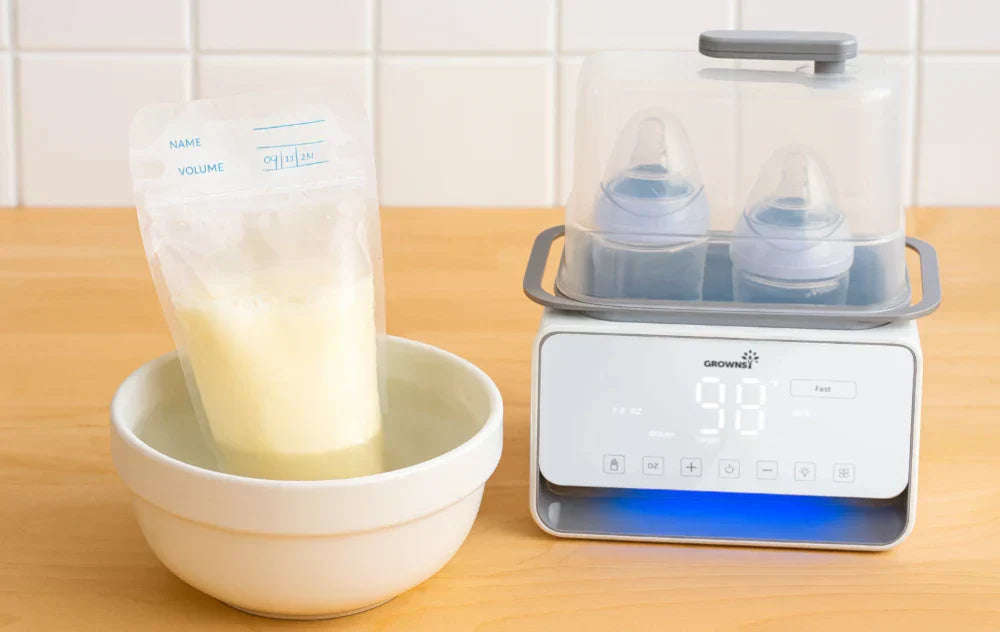As a new parent, I know how important it is to keep feeding time safe and stress-free. Warming frozen breast milk properly helps preserve its nutrients and avoids hot spots that could hurt your baby. Always thaw and warm milk gently: for example, the CDC recommends thawing frozen milk in the fridge or in warm water, and explicitly never using a microwave (usda.gov). Below are the best practices I’ve learned (and use myself) to safely store, thaw, and warm breast milk so your baby gets the best nutrition every time.
Storing and Freezing Breast Milk Safely
Before we talk about warming, it helps to handle storage right. Store expressed milk in clean glass or BPA-free plastic bottles or special breast-milk bags. Always label containers with the date and amount. Refrigerate milk promptly (back of the fridge is coldest) if you’ll use it within 3–4 days, and freeze milk you won’t use soon.
Freeze in small batches (2–4 oz is ideal for one feeding), leaving about an inch of space at the top since milk expands when frozen. Store frozen milk at 0°F or colder (deep freezer), where it’s best used within 6 months (up to 12 months is acceptable). Remember “first in, first out”: always use the oldest milk first.
Thawing Frozen Breast Milk
To thaw frozen milk, move it from the freezer into the refrigerator and let it sit overnight. This slow thaw is safest and most even. If you need milk sooner, you can thaw it under lukewarm running water or in a bowl of warm water. Keep the container sealed while thawing (don’t open the bottle or bag). Gently swirl or tilt the milk as it thaws to help mix any separated fat back in.
Tip: The fatty layer often floats on top after storage – a gentle swirl is all you need. Don’t shake vigorously, as that can introduce bubbles and slightly break down the milk’s proteins.) Importantly, never thaw or heat breast milk in a microwave or by boiling. Both the CDC and health experts warn that microwaves create dangerous hot spots and can damage breast milk’s antibodies.
Warming Breast Milk (Step by Step)
If you choose to warm the thawed milk, do so gently. Babies can drink breast milk cold, room-temperature, or warm, but many prefer it warmed to about body temperature (around 98–100°F).
To warm, fill a bowl or cup with warm water (not boiling) and place the sealed bottle or bag in it for a few minutes. You can also hold the sealed container under warm running water. The key is warm water, not hot.
After a minute or two, check the temperature: place a few drops on your wrist – it should feel lukewarm, never hot. Always test before feeding.
Once warm, remove the container from the water, gently swirl to mix any cream that rose to the top, and feed your baby.
If you have a bottle warmer, it can make this process even easier. For example, our Grownsy bottle warmer has a “breast milk” or “defrost” setting: just add water, insert the frozen bottle, and set it. The warmer heats very evenly, so you don’t have to wait for a water bath. (Pro tip from experience: I’ve found that using the timer function on a bottle warmer means I can start warming as soon as I bring the milk out of the fridge, and it will be ready right on schedule.) Just follow the device instructions and never let milk get hotter than the recommended temperature. Some bottle warmer manuals caution that improper use can overheat milk, so it’s still smart to check with your wrist test. A bottle warmer is especially handy when traveling or during nighttime feedings for a quick, controlled warm-up.
You can also read our more detailed guide on warming baby milk here.
Tips and Safety Reminders
- Test the Temperature: Always shake or swirl the warmed milk gently and put a few drops on your inner wrist. It should feel warm (like a warm bath), not hot. This is the best way to avoid scalding your baby.
- Time Limits: Once breast milk is fully thawed in the fridge, use it within 24 hours. After you warm it (or if it’s left at room temperature), feed your baby within 1–2 hours. Discard any leftovers after 2 hours. Never refreeze thawed milk. These limits help prevent bacterial growth.
- Leftovers: If baby doesn’t finish a bottle, toss the remaining milk after two hours. (Any milk baby partially drinks can introduce mouth bacteria back into it.) Plan small feedings to minimize waste.
- Milk Smell/Look: It’s normal for thawed breast milk to look or smell different than fresh milk. Some moms notice a soapy or sour scent from an enzyme called lipase – this is harmless and doesn’t mean the milk is bad. If your baby seems fine drinking it, you’re all good. If baby refuses it, try warming slightly cooler or using fresher milk first.
- No Need to Shake: Vigorous shaking can create bubbles and slightly break down milk proteins, so just swirl gently to mix layers.
- Serve as Baby Likes: Remember, breast milk doesn’t have to be warm. Many babies will drink it cold or room temperature. If your baby prefers warm milk, use the gentle heating methods above. Otherwise, it’s perfectly safe to feed refrigerated milk without warming.
Warming breast milk becomes second-nature once you get the hang of it. The most important rules are to thaw and heat gently and check the temperature. By following these steps – thawing in the fridge or warm water, using a gentle water bath or bottle warmer, and following the 2-hour/24-hour rules – you can ensure your baby always gets safe, nutritious milk. With practice, you’ll find the routine that works best for you and your little one. Happy feeding!
Further resources on the topic we recommend you to read: cdc.gov, usda.gov, mayoclinic.org, healthline.com

